Government Shutdown Looms in Northwest Montana
As Congress heads towards an appropriations stalemate, driven in part by Montana’s U.S. Rep. Matt Rosendale, the state’s land managers and federal employees are preparing for closures
By Denali Sagner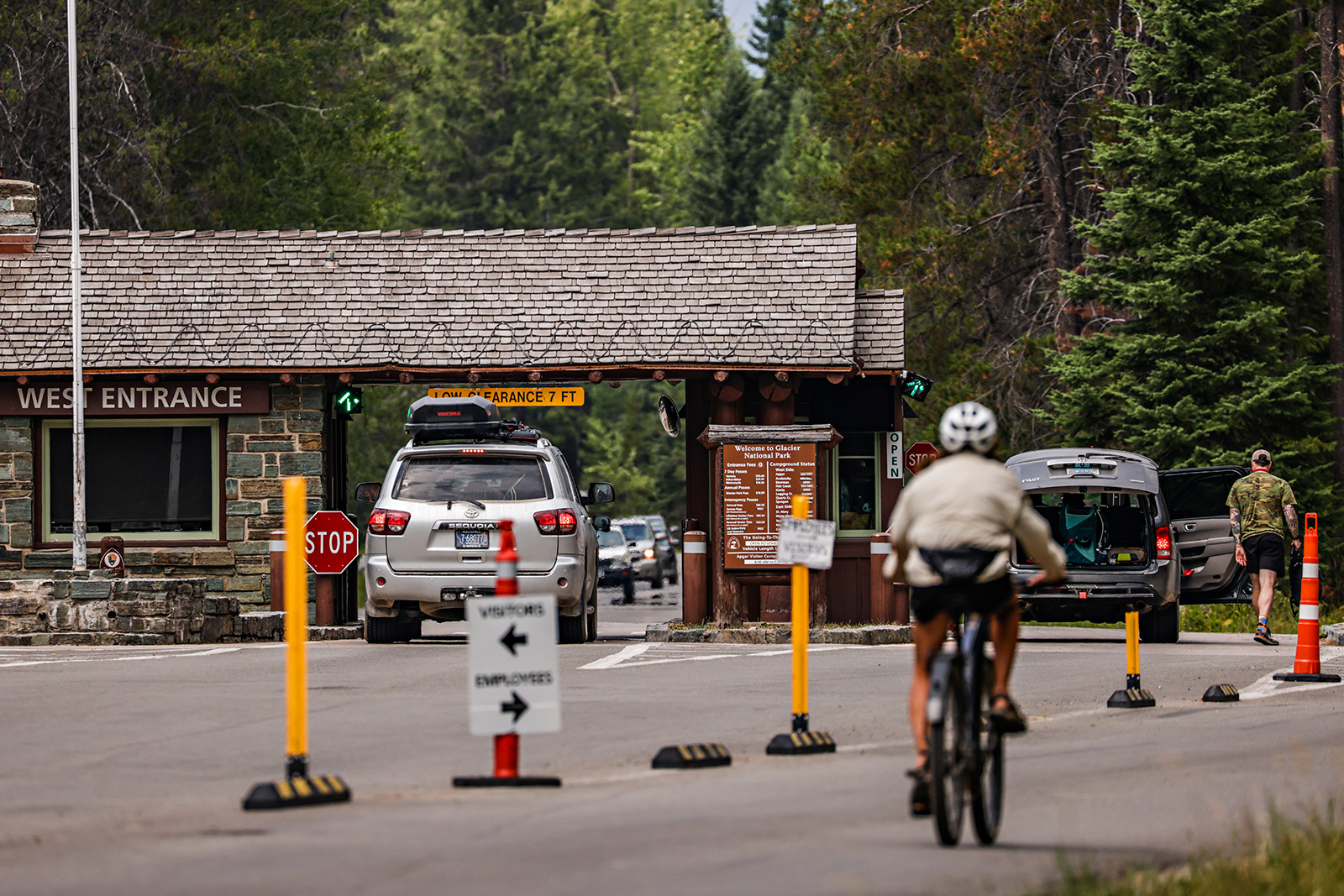
When visitors attempt to enter Glacier National Park on Monday morning, there may be a “closed” sign hanging at its front gate.
After another week of contentious and seemingly fruitless Congressional budget negotiations, the United States is inching closer to a government shutdown that could slow the work of federal agencies from the National Park Service to the Department of Homeland Security.
Each year, Congress is tasked with passing 12 appropriations bills that fund the federal government for the following fiscal year, which begins on Oct. 1. While Speaker of the House Kevin McCarthy reached a popular agreement during debt limit discussions with President Joe Biden in May, delineating federal spending targets for two years, a small cadre of right-wing House Republicans this fall have blocked the passage of spending bills until a handful of their policy and budgetary demands are met. If an agreement is not reached by midnight on Sunday, funding the government past Oct. 1, all federal agencies will be forced to cease non-essential functions.
Though Montana is nearly 2,000 miles from Washington, D.C., the shutdown is expected to impact the state, which is home to two national parks, over 27 million acres of federal land and approximately 13,900 federal employees. As the clock runs out on the Congressional appropriations process, northwest Montana’s land managers and outdoor recreation advocates are preparing for a landscape of potential closures, furloughs and limited resources — with no clear end in sight.

The federal government has shut down 21 times in the past five decades, with shutdowns ranging in length from one to 34 days.
In 2013, the government ground to a halt for 17 days as the Republican-led House and Democratic-led Senate, as well as then President Barack Obama, reached a stalemate over appropriations for the Affordable Care Act, or Obamacare. The most recent, and longest, shutdown occurred in 2018 after then President Donald Trump refused to sign any appropriations bills that did not include $5.7 billion in federal funding for a U.S.-Mexico border wall.
Public lands during a federal shutdown do not follow a uniform formula, leaving a flurry of questions about if and how citizens will be able to recreate on lands managed by the National Park Service, U.S. Forest Service, Bureau of Land Management and U.S. Fish and Wildlife Service come Oct. 1, should the government cease operations.
“No one’s really sure exactly what this one will look like,” Anthony Licata, communications director for Montana Conservation Voters, said.
Representatives from the National Park Service on Thursday afternoon said that the majority of national parks will be closed and thousands of park rangers will be furloughed if a shutdown occurs. Representatives from the Bureau of Land Management and U.S. Fish and Wildlife Service declined to offer comment for this story. The U.S. Forest Service did not respond to request for comment.
During the 2013 government shutdown, the Obama administration shuttered all of the country’s national parks, suspending all activities except emergency services and leaving thousands of workers furloughed. Roughly 250 workers at Glacier National Park were impacted by the closure, trail crew workers and seasonal employees abandoned critical projects they intended to complete before winter and visitors arrived in West Glacier, only to be turned around.
In 2018, Trump administration officials and the Department of the Interior, led at the time by Montana’s now Republican U.S. Rep. Ryan Zinke, opted to keep the parks open with limited services available. Days into the shutdown, reports emerged of deteriorating conditions in the parks.
“The Trump administration kept them open, which is good in some ways for the local economy and for local folks and tourists who are doing trips, but it also caused a lot of problems with the parks as far as degradation of habitat,” Licata said. “The parks weren’t cared for and were running on skeleton staffs with overflowing garbage and sewers and all that, including Glacier.”
Though the parks stayed open in 2018, around 800,000 federal workers were furloughed, while others were required to work without pay. About 185 of the Flathead National Forest’s 205 permanent staffers were furloughed at the time.
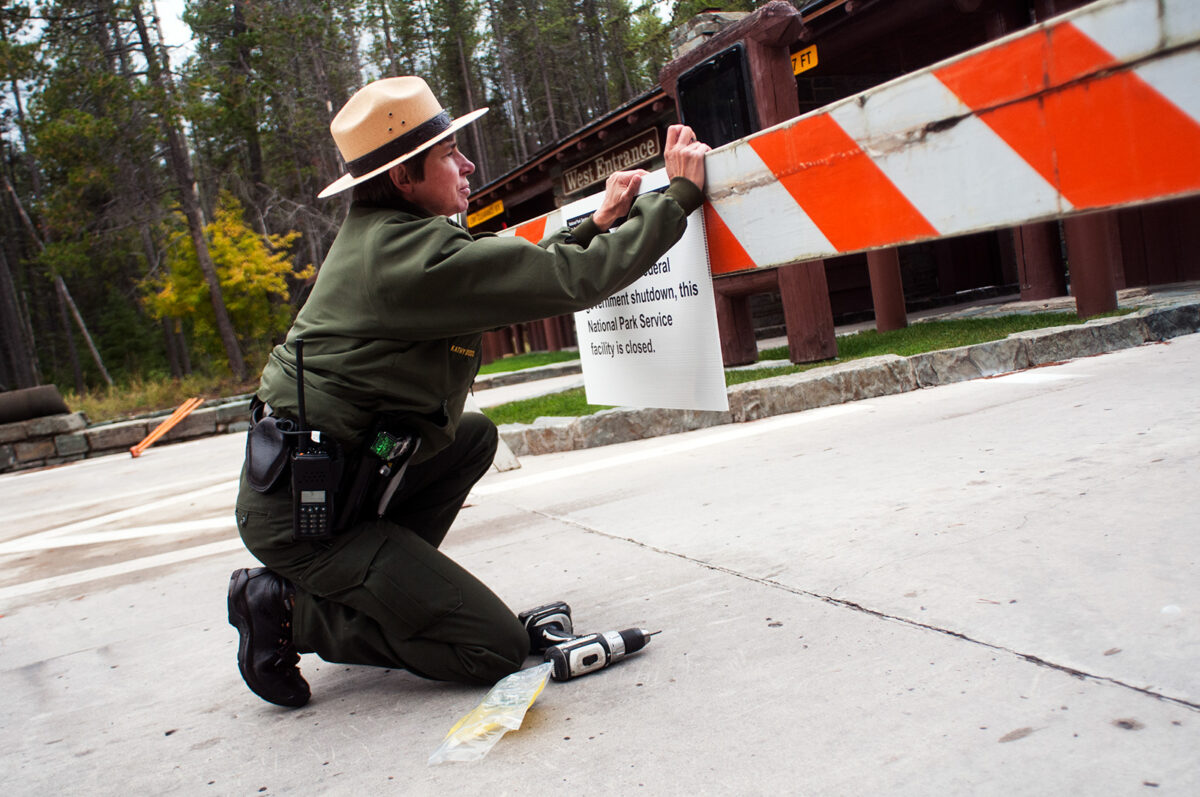
In a place like the Flathead Valley, the shuttering of Glacier National Park, the area’s most popular tourist attraction, stands as the most striking indication of a Congressional stalemate. Visitors to Glacier contributed $548 million to the local economy in 2022, supporting 5,691 jobs, roughly 10% of the total employment in Flathead and Glacier counties.
While October marks the beginning of “shoulder season” and tourism to Glacier drops off considerably, fall is one of the last chances for gateway businesses to bring in profits before the long winter sets in, and is a popular time for locals to visit the park.
“It really is painful to have this be a bargaining chip in this fight, because it impacts Montanans. It impacts our recreation economy,” Licata said. “This is a terrible time for it, too. The tourist seasons are winding down. There’s only so much of the season left for local communities to make their money for the year. And also, this time of year is a time when Montanans visit our national parks quite a bit.”
The reach of the federal government in northwest Montana extends far beyond Glacier, leaving local land managers and conservation advocates concerned about the fate of numerous public sites come Oct. 1.
“First and foremost, we hope that government shutdown can be avoided at all costs,” Kevin Farron, regional policy manager with Backcountry Hunters and Anglers (BHA), said, calling the looming shutdown a “self-created and completely avoidable problem.”
Farron said that while many Montanans hunt on federal lands, they often do so on sites that are more loosely managed and will likely remain open during a shutdown, such as national forests.
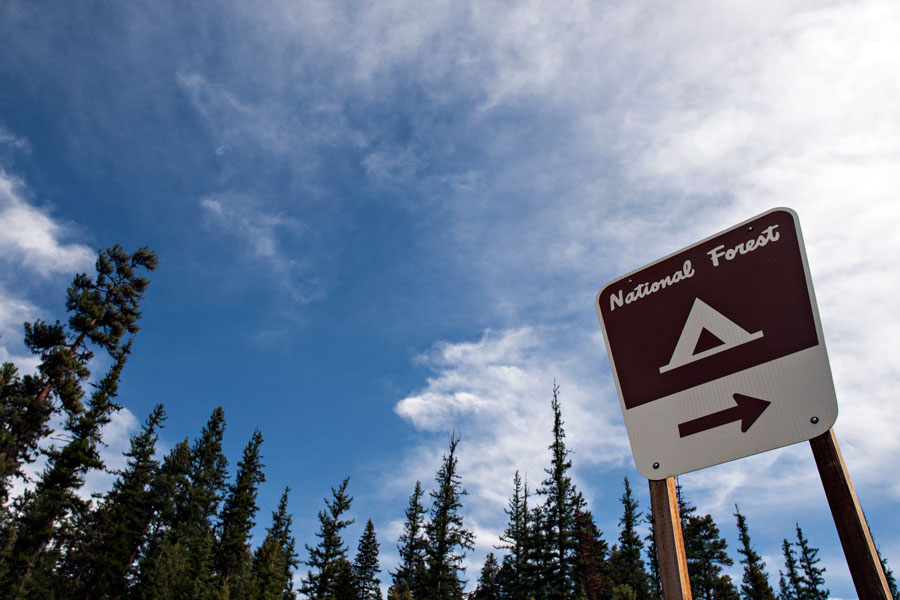
“Our fingers are crossed that much of what we like to do won’t be impacted in the same way that federally managed lands like national parks may be impacted,” he said.
However, Farron said that BHA is concerned with “the really good work our land managers do on the ground,” such as trail maintenance, prescribed burns, fishing access cleanups and habitat improvement projects, should a shutdown ensue. Programs run by the U.S. Forest Service, Bureau of Land Management, Bureau of Reclamation and U.S. Fish and Wildlife Service could all be put on hold.
“We have a small window for a lot of this work,” Farron said, adding that it would be “unfortunate” to see these projects halted.
“They’re just running on absolute bare bones, minimum staff. So, all kinds of things fall behind — different scientific projects, habitat work. It has big impacts beyond the economy,” Licata said, echoing similar concerns.
Staff members at the Lost Trail National Wildlife Refuge in Marion were instructed not to report to their office on Monday if the government shuts down, however they have not been told whether or not the refuge itself will remain open. The Hungry Horse Dam Visitor Center, which is managed by the Bureau of Reclamation, will be closed if a shutdown happens. So will the Swan Lake Ranger Station and visitor center, which falls under the jurisdiction of the U.S. Forest Service.
As the Flathead Valley prepares for closures and furloughs that could ripple through the local economy, Montana’s Congressional delegation is split on the spending measures at the center of the looming shutdown. In a protest that has launched him into the national spotlight, Montana’s U.S. Rep. Matt Rosendale has joined a coalition of hard-right Republican lawmakers who vow not to vote for appropriations measures supported by McCarthy and the majority of House Republicans.
“Our country is facing $33 trillion of national debt, and once again, Washington is proposing a ploy to continue Nancy Pelosi’s budget and Joe Biden’s policies by bringing forward a continuing resolution,” Rosendale said during a Wednesday night tele-town hall where he fielded questions from numerous constituents.
“We cannot continue kicking the can down the road and let our country go down this path of financial ruin. You didn’t send me to Washington so I could go along to get along. That’s why I stood up to the DC cartel the last few days by saying I would not support a continuing resolution,” he added.
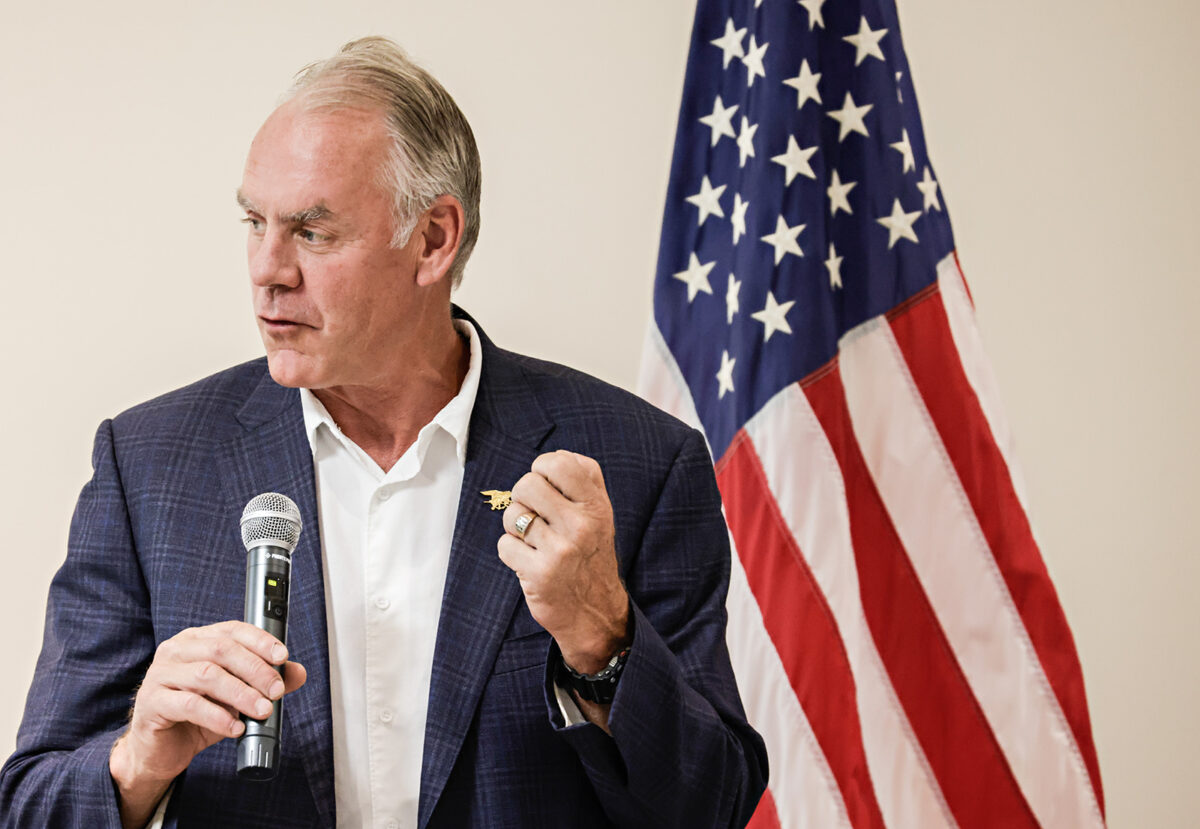
Rosendale did not take a question from the Beacon about a possible shutdown.
The congressman, who has represented Montana in the House since 2021 and is a member of the right-wing Freedom Caucus, told constituents that he will continue to reject appropriations bills and stopgap measures until a number of demands are met, including spending cuts for “Biden’s alphabet agencies” and the war in Ukraine.
“The appropriation bills are critically important for us to begin cutting spending,” Rosendale said. “They are the only way for us to begin scaling back funding for Biden’s alphabet agencies, such as the ATF, the IRS, the FBI and DOJ that all have been weaponized against the American people. They are the only way for us to put an end to the left’s Green New Deal agenda and the left’s social experiment being forced upon our military. They are the only way for us to secure our southern border and stop the flow of illegal people and drugs into our country.”
Despite the media spotlight that has landed on Rosendale as he protests budget negotiations, he is alone among Montana’s Congressional delegates, the rest of whom have pushed for the House and Senate to agree on the budget and avoid shutdown.
“I think the bottom line is Congress needs to do their job,” Zinke, the U.S. Representative for Montana’s western Congressional district, told the Beacon on Thursday.
While not naming Rosendale outright, Zinke criticized Republicans who have obstructed the appropriations process and brought the country to the brink of shutdown. He warned of the consequences of a shutdown for everyday people, and said that he opted to keep the national parks open during the 2018 government shutdown as to not “harm the innocent.”
“It’s not a Freedom Caucus issue, because the chairman of the Freedom Caucus, who I know very well, he’s advocating to vote for them. So is Jim Jordan. So is Marjorie Taylor Greene. So are the real leaders of the conservative movement,” Zinke said. “All of them see that the way forward is to do what we said we would do and pass the appropriation bills. I’m hoping everyone comes to the same conclusion.”
Both Montana’s Republican U.S. Sen. Steve Daines and Democratic U.S. Sen. Jon Tester offered statements in support of passing the appropriations bills to avert shutdown.
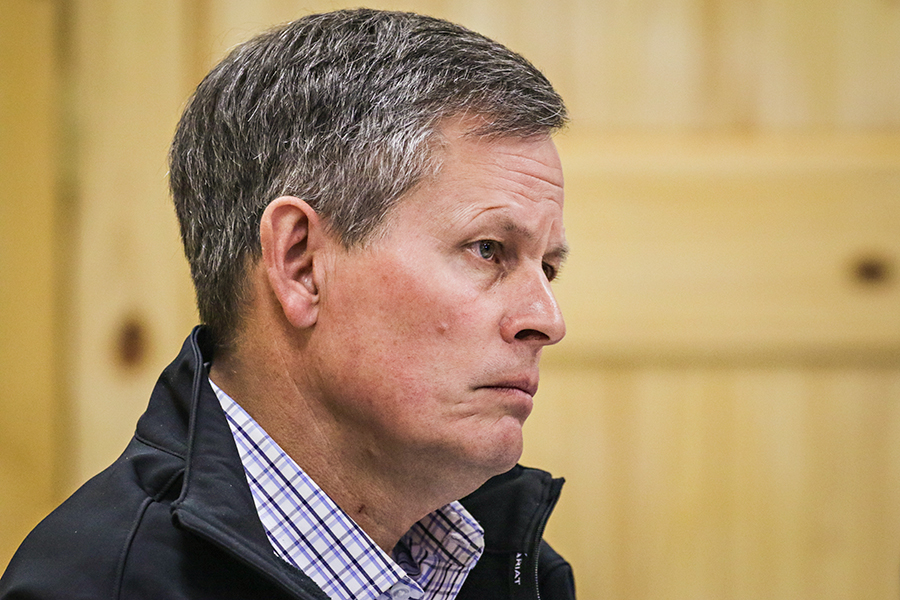
“It’s simple: if Congress can’t fix its broken budget process and pass all 12 appropriations bills on time, members should not get paid,” Daines said in a Sept. 14 statement. “Shutting down the government fails to bring any common sense back to Washington and only hurts Montanans, especially our seniors and veterans. Montana families should never have to pay the price for Congress’ irresponsibility.”
“On a farm, you don’t get to play games and expect someone else to get the work done. Montana veterans are tired of their elected leaders playing politics with the benefits and support they earned, and Congress needs to work in a bipartisan way to fund the government. Let’s be very clear: a shutdown wouldhurt our veterans by suspending critical programs they and their families rely on, and undermine our national security. Montanans deserve better, and it’s time for Congress to step up and lead,” Tester said.
Though Zinke said he is optimistic about the budget negotiations, the reality of a shutdown looms larger each day, as Congress gets closer to Oct. 1 without a deal.
Across Montana, land managers and their employees are beginning preparations for an unpaid vacation that could stretch on for days, or even weeks.
Looking ahead to October, Licata said, “Our best hope is that a deal gets done and they stop playing politics with our public lands and our national parks.”